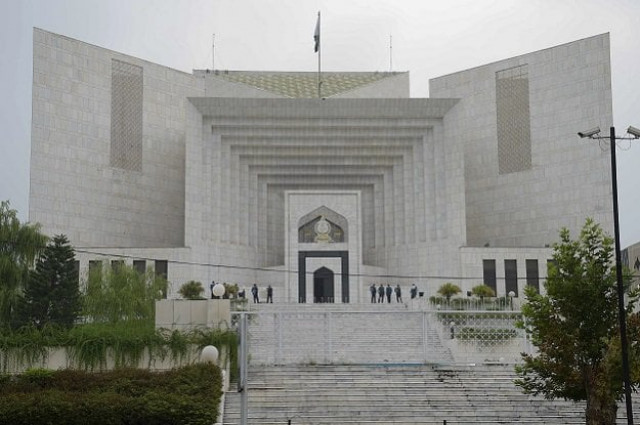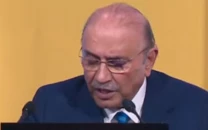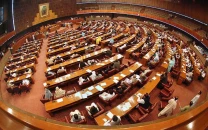Ministry’s stance for open SJC proceedings irks AGP
SC sought reply on plea of judge facing allegation of misconduct

PHOTO: FILE
In response to a Supreme Court larger bench order in IHC Justice Shaukat Aziz Siddiqui’s case, the ministry has prepared a draft backing his stance seeking open trial by the SJC.
The five-judge larger bench, headed by Justice Gulzar Ahmed, asked the federal government on November 8 to file a reply after the procedure of inquiry against superior courts judges was challenged by Justice Siddiqui.
“Keeping in view the best international practices with regard to principles of natural justice and public hearings and fundamental rights guaranteed in Articles 4, 10-A, 14, 19 and 25 of the Constitution, it is prayed that the ‘Supreme Judicial Council Procedure of Inquiry 2005’ may be declared unconstitutional and with no legal effect and the matter be referred to Parliament for enactment of a prescribed procedure in accordance with the constitutional guarantees,” says the ministry’s five-page reply. It adds that most states prefer public hearings in judges’ cases.
AGP office submits additional evidence to SJC
Interestingly, copies of the ministry’s reply were circulated among media persons but Attorney General Ashtar Ausaf Ali has revealed that it has yet to be submitted.
A senior law officer told The Express Tribune that the Ausaf expressed concern over the reply because the ministry’s stance negated the view he had taken before the SJC in the case. “The AGP office has written a letter asking the ministry to reveal the identity of the competent authority which approved this draft,” he said.
It has been learnt that the reply has been drafted on the instructions of Prime Minister’s Special Assistant Barrister Zafarullah Khan.
The attorney general had opposed the IHC judge’s plea before the SJC for his open trial instead of in-camera proceedings. He said the conduct of a judge could not be discussed in open proceedings and it was also better for the accused judges that the proceedings be conducted in camera.
The proceedings of the Judicial Commission of Pakistan (JCP) on the appointment of superior courts judges were also held in camera, he pointed out. He believes that to be a judge is not a fundamental right but an honour, therefore, summary inquiry of the accused judges was proposed.
SJC dismisses IHC judge's plea for open trial
The SJC dismissed in May the high judge’s plea seeking open trial of the proceedings against him over alleged misconduct.
The council observed that it was in the larger interest of the judiciary that the proceedings were not conducted in open court as the allegations might ultimately prove to be false, frivolous or vexatious.
“Thus the holding of in-camera proceedings is absolutely is line with the principles laid down in the opinions in this court in Justice Shaukat Ali and Chief Justice Iftikhar Muhammad Chaudhry cases.”
It observed that the SJC did not determine the civil or criminal liabilities of a judge against whom proceedings were being conducted, therefore the request for an open trial on the touchstone of Articles 4, 10-A and 25 of the Constitution was not well-founded.
“We are also not persuaded to hold that after the inclusion of Article 10-A into the Constitution, the legal position has changed and the SJC has attained the status of a court and that the proceedings before the SJC would be conducted like a civil or criminal trial,” the order said.
The council observed that apprehensions about likely prejudice were unfounded because full confidence on the SJC had been expressed by the counsel for the applicant.
SJC stops proceedings of misconduct against Justice Shaukat Aziz Siddiqui
It said it had been made clear to the applicant and his counsel Makhdoom Ali Khan that the proceedings would be conducted in a fair and transparent manner and the rules of natural justice would be duly observed.
The order said it was on account of the sanctity of the institution and dignity of the judges whose matters were inquired into that in-camera proceedings were expedient. “It is also held that the council does not find that in-camera proceedings would deny the judge’s right to defend himself in a robust and meaningful manner. Therefore, we do not find any merit in this application, which is accordingly dismissed.”
But the judge’s 14-page constitutional petition requested the SC to declare that SJC’s order of May 18 null and void, contending that it was passed without lawful authority. The petition stated that the judge had nothing to hide and his dignity would not be compromised if the proceedings were held in camera.
The petitioner said due process required a reasonable opportunity to defend oneself, which was not guaranteed in a secret trial. “There is no greater protection than free speech and a free press for the independence of constitutional institutions,” the petition said.



















COMMENTS
Comments are moderated and generally will be posted if they are on-topic and not abusive.
For more information, please see our Comments FAQ